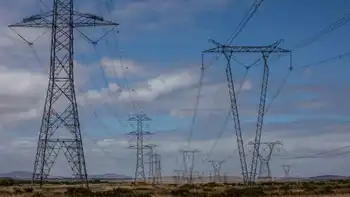Woman on oxygen dies after power cut to home
By Associated Press
High Voltage Maintenance Training Online
Our customized live online or in‑person group training can be delivered to your staff at your location.

- Live Online
- 12 hours Instructor-led
- Group Training Available
Kay Phaneuf, 53, died at Caritas Holy Family Hospital in Methuen, Mass. She had been in critical condition since her husband found her unconscious about an hour after power was cut to their home in Salem.
"She can't survive without it," Salem Police Capt. Shawn Patten said of the oxygen equipment. "They cut the power to the house, the power to whatever machine she had went out, and that was it."
There was a backup battery on the machine, but it had not been activated, he said. Such devices often have alarms indicating when power is cut, but it wasn't clear whether Phaneuf's had one.
The electricity bill hadn't been paid, Patten said, but state regulations require written notice to be given two weeks before a shutoff.
The utility, National Grid, declined to say why the power was shut off, citing privacy and confidentiality reasons. But it said it was possible Phaneuf and her husband hadn't kept the company apprised of her needs.
"It's my understanding that we followed the proper procedures that would include notifying customers that their service was going to be shut off," said National Grid spokesman David Graves. He said the company has started an internal review and is trying to ensure the right safeguards are in place to prevent a recurrence.
A meter worker arrived at the house at about 9 a.m. that Monday to shut off the power, Graves said. He knocked on the door and rang the doorbell but got no response and turned off the power.
National Grid got a call about an hour later from Salem police asking that a supervisor get to the house, Graves said. The supervisor arrived at 10:30 a.m. and was told by police that a resident had been taken to a hospital.
Police were not pursing criminal charges, but the New Hampshire Public Utilities Commission was investigating. Gov. John Lynch asked the agency to conduct a broad review of utility companies' procedures on power shutoffs.
Customers who require electricity for medical equipment can prevent National Grid from shutting off service by sending a letter from their doctor. Under state regulations, customers need to renew such information every 60 days Graves said National Grid gives customers 90 days to renew.
Phaneuf's account has had such a medical notice in the past, but it was possible it had lapsed, Graves said. Graves said he didn't know whether the power had been shut off there before.
Lynch said Friday that the Utilities Commission should assess the "adequacy of policies and safeguards related to power shutoffs" and whether utilities are following them. He asked for a report by July 30.
Utilities in every state keep "medical priority lists" designed to track who depends on power for life, but an Associated Press survey last year found huge state-to-state variations, suggesting only a fraction of patients know they're available.
In December 2008, when New Hampshire suffered one of its worst power failures in history during an ice storm, a disabled man who died without power to run his oxygen equipment had not told the fire or police departments to keep a watch over him during outages.











